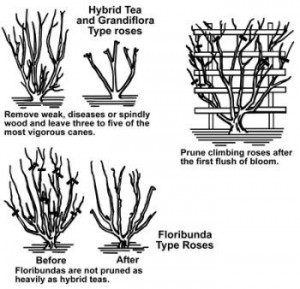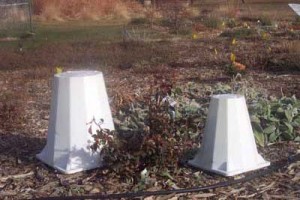By Andy Crossland, ACMG
 You have pruned, fertilized, watered, sprayed, and weeded since spring. Your efforts have been rewarded with blossoms that no artist can do justice. Most gardeners “do not go easily into that dark night” of winter but try to prolong the growing season. Do your neighbors look out the window to see what that “crazy gardener next door” is doing in the yard covering the plants on the first few nights that frost is predicted?
You have pruned, fertilized, watered, sprayed, and weeded since spring. Your efforts have been rewarded with blossoms that no artist can do justice. Most gardeners “do not go easily into that dark night” of winter but try to prolong the growing season. Do your neighbors look out the window to see what that “crazy gardener next door” is doing in the yard covering the plants on the first few nights that frost is predicted?
Eventually we all give in to the futility of trying to keep winter at bay. We need a rest, and so do our roses. If we do not want to treat our roses as annuals, we have some work to do before we settle down with the catalogs that bring dreams of next year’s triumphs.
Just as we deadhead to prevent the rose from setting hips (seeds) we can now send a message to the plant that its job has been accomplished for this year. The seeds necessary to insure a future generation of this plant are in the hips. The plant can now concentrate on storing energy to survive the winter, and come back in an even grander fashion than this year. There can be no set date to stop cutting the roses off. You must take into account the microclimate and your own variation of the growing season. Generally stop cutting roses off your plants 6 weeks before first frost is expected. Decrease water as the plants go dormant.
Cleanliness is next to …
When the roses have gone dormant, clean up all the debris. This includes leaves, mulch, and pruning clippings. All of these may provide a place for insects and diseases to winter over. Do not use this debris for compost that will be used on your roses next year.
 Winter pruning . . .
Winter pruning . . .
Do you have to prune your roses for winter? This again will be an educated call on your part. If your roses are exposed to areas of high wind with no protection, you may want to prune them to prevent the wind from rocking the plant, thus damaging the roots. Some roses bloom on last year’s canes. If you prune them off, there will be no roses next year. There are many books on roses and pruning. The library and your local nursery are good places to start. Call the local Extension office and ask a Master Gardener for help. Join a local rose society. The American Rose Society has a monthly magazine that is included in their membership fee.
Mulching for winter . . .
Most people think that you winter mulch roses to keep them warm. The graft union does need some protection, but keeping the rose dormant is the best benefit of winter mulching. Let the ground freeze before you mulch, as this helps keep moles, and mice from tunneling into your mulch and setting up housekeeping for the winter. They will appreciate the rose bark you have provided for their culinary pleasure, but you won’t like girdled stems that either stunt or kill your roses.
Cones, Collars, or the Minnesota Tip . . .
 There are as many ways to protect your plants for the winter, as there are gardeners. You can do nothing. You might get lucky. Dirt covered with
There are as many ways to protect your plants for the winter, as there are gardeners. You can do nothing. You might get lucky. Dirt covered with
straw, either with a chicken wire support or not is a relatively inexpensive way to go. There are Rose domes of Styrofoam, or pressed paper. Some
people take cuttings that are rooted from their plants into a green house as insurance for winter survival. In extreme situations you can use the Minnesota Tip. Developed in Minnesota by a man who was tired of losing his roses every year, the Minnesota Tip involves trenching the rose plant into the ground by loosening 1/2 the roots and laying the plant into the trench. The plant is covered with straw and soil. This is also used for tree roses that are too tall to mulch. When danger of a killing frost is past, stand the plant back up. Use the same techniques that you used in the first place.
Hardiness . . .
Most species roses tend to be hardy. Roses grown on their own roots instead of grafted to a root tend to be hardier. Roses grown in local nurseries are a pretty good bet too. See what your neighbors are growing. Ask a Gwinnett Extension Agent or rose-loving Master Gardner. Grafted roses from your local nursery are usually proven roses for your area. Most mail order roses are guaranteed. If you’re not sure, ask them before you buy.
